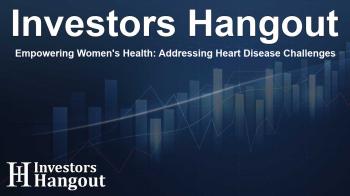Empowering Women's Health: Addressing Heart Disease Challenges

Empowering Women's Health Challenges in Heart Disease
Heart disease remains a leading health threat for women, claiming a staggering one in five lives—more than all cancers combined. This condition affects over 60 million American women, many of whom remain unaware of their heart health status until symptoms manifest. Dr. Nishtha Sareen, a leading figure in women's cardiovascular care, emphasizes the critical need for targeted interventions and education in this space.
Understanding the Gaps in Cardiovascular Care
A significant challenge in addressing women's heart health revolves around the limited representation of women in clinical trials. This disparity often leads to misdiagnoses and delayed treatments. Traditional medical education lacks a focus on female-centric cardiovascular diseases, like angina that occurs with open arteries and postural orthostatic tachycardia syndrome. There is also insufficient training on disorders unique to women, such as those connected to obstetrics, menopause, and gynecology.
Economic Barriers for Medical Professionals
From the perspective of physicians, financial sustainability in practice heavily influences how care is administered. After over a decade of rigorous training and accruing substantial student loans, many healthcare providers feel pressured to prioritize patient care compensation over holistic treatment approaches. The existing compensation models often fail to accommodate gender-specific healthcare needs. This gap discourages the development of comprehensive programs to guide the diagnosis and management of female-specific health issues.
Initiatives Driving Change in Women's Heart Health
To rectify these disparities, various innovative interventions are underway. Training opportunities for healthcare professionals are growing, including dedicated symposia and webinars that offer Continued Medical Education (CME) credits. One such initiative, a podcast series titled "BIA for you, for them," and the accompanying book, "BIA: She is the Force," aim to educate and empower healthcare providers about the intricacies of women’s heart health.
Community Engagement: The Key to Awareness
Effective community engagement must also be prioritized. A widespread perception persists that breast cancer is the leading cause of death among women, despite heart disease claiming six times more lives. Educating the community about heart health is crucial, from initiating routine screenings to teaching individuals how to recognize symptoms and manage risks. Collaborative efforts are essential for raising awareness and fostering support for women's heart health.
The Call to Action: Prioritizing Women's Heart Health
All of us must actively contribute to the movement advocating for women's heart health. By working together—sharing knowledge, building networks, and promoting advocacy—we can transform the landscape of women's cardiovascular health. It’s time to unite for awareness and action: the phrase "BIA yourself" not only resonates with individual empowerment but also signifies a necessary collective response to this pressing health crisis.
Frequently Asked Questions
What is the main issue facing women's heart health today?
Women's heart health is critically underrepresented in clinical studies, leading to misdiagnosis and inadequate care. Advocating for gender-specific research and training is essential.
How can physicians improve care for women's heart health?
Continuing education focusing on women's cardiovascular issues, alongside a shift in compensation models to prioritize gender-specific care, can enhance treatment outcomes.
Why is community awareness about heart disease important?
Inaccurate beliefs about health risks can prevent women from recognizing heart disease as a leading cause of death. Educating the community is vital for early intervention and prevention.
What initiatives are being taken to address women's heart health?
Innovative training programs, podcasts, and educational resources are being developed to inform healthcare providers about the unique aspects of cardiovascular health in women.
How can individuals contribute to improving women's heart health?
By participating in awareness campaigns, advocating for community education, and fostering support networks, individuals can significantly influence the landscape of women's heart health.
About The Author
Contact Henry Turner privately here. Or send an email with ATTN: Henry Turner as the subject to contact@investorshangout.com.
About Investors Hangout
Investors Hangout is a leading online stock forum for financial discussion and learning, offering a wide range of free tools and resources. It draws in traders of all levels, who exchange market knowledge, investigate trading tactics, and keep an eye on industry developments in real time. Featuring financial articles, stock message boards, quotes, charts, company profiles, and live news updates. Through cooperative learning and a wealth of informational resources, it helps users from novices creating their first portfolios to experts honing their techniques. Join Investors Hangout today: https://investorshangout.com/
The content of this article is based on factual, publicly available information and does not represent legal, financial, or investment advice. Investors Hangout does not offer financial advice, and the author is not a licensed financial advisor. Consult a qualified advisor before making any financial or investment decisions based on this article. This article should not be considered advice to purchase, sell, or hold any securities or other investments. If any of the material provided here is inaccurate, please contact us for corrections.

